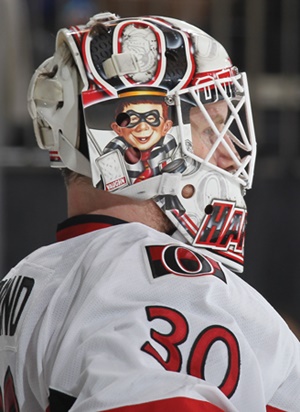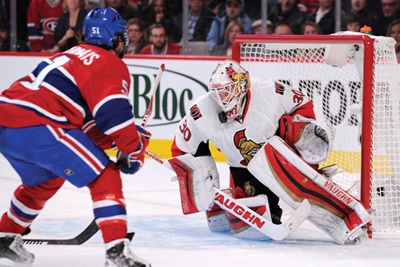If you’re a pro hockey fan or just a good old-fashioned sports marketer, you probably heard about last year’s sponsorship excitement involving a young goaltender playing for the NHL’s Ottawa Senators. Don’t tell us you missed it. Even our respective students thought it was “epic.”
Andrew Hammond, a then 27-year-old who played his college hockey at Bowling Green, was finally getting his chance to play in the NHL. Interestingly, he had decided to carry the nickname Hamburglar, which many people over 40 might recognize as the McDonald’s cartoon character fictitiously immortalized for stealing hamburgers.
Hammond didn’t steal sandwiches. He stole goals from opposing players. And the Ottawa fans soon loved him for it. By chance, McDonald’s was a sponsor of the Senators.
So there you have it. A player’s nickname was catchy and fun (not to mention his helmet graphics were cool) … and then something even more unusual went down.
Hammond responded to a late-season call-up to the Senators by going 17-1-1 in his first 19 starts, which (incredibly) led to the greatest comeback run by a team making the playoffs in NHL history. Hammond’s performances electrified a fan base that had not seen much to cheer about since a 2007 run to the Stanley Cup Final. Simply put, the Hamburglar’s brilliance led to pandemonium in Ottawa and high interest in the professional hockey world.
So good was Hammond’s run that Ottawa fans were reported to have started eating McDonald’s burgers pregame to keep his streak alive, while others threw them on the ice after games and still more started filling social media with mentions and rementions of both McDonald’s and Hammond.
 |
McDonald’s moved quickly to activate around Hammond’s nickname.
Photos by: GETTY IMAGES (2)
|
As reported by Don Brennan in the Ottawa Sun, McDonald’s took notice when Hammond picked up a hamburger that a fan threw on the ice and saluted the crowd with it. Moving like an entrepreneur, the burger giant awarded the Hamburglar with McDonald’s food for life.
This is a sponsor that was able to turn something as mundane as a hockey player’s nickname and convert it into a sponsorship activation. This is about a big bureaucratic sponsor that moved quickly enough to capitalize on an unpredictable streak that could’ve stopped at any moment.
We acknowledge that McDonald’s was an official Senators sponsor, which helped the situation come to life. But, unquestionably, McDonald’s was either prepared for the opportunity or knew how to move on a market opportunity. This ability seems pretty rare in conservative companies, and when we see it, we have to give the company props.
“When an opportunity like this
develops
naturally on its own, it’s incumbent on a pro team and sponsor to be aware of the environment and act quickly if they are going to capitalize on the activation,” Cyril Leeder, president of the Senators, told us. “McDonald’s moved swiftly, and this was only possible because of our long-standing [and] strong partnership with them. I am not sure we could have acted as quickly, or as effectively, with one of our newer partners.”
What Leeder said next was also interesting as it relates to fan avidity and knowledge of the fan base.
“The Hamburglar activation resonated with all of our fans, young and old. He’s a character many of our baby boomers recognized and loved, and his appearance in the arena and throughout the community added significantly to Hamburglarmania in Ottawa,” Leeder said. “But give the McDonald’s activation and sponsorship team credit for recognizing the opportunity and acting on it so quickly.”
Recognition of the fans and decisive speed cause us to cite an academic example about coaching that one of us worked on years ago. The premise was that managing in baseball was about picking the right players and hoping they would make the right plays in the field. In football, the coaches needed to pick the right players and the right plays, and then tell the players exactly what to do. Players weren’t required to think as much as they needed to know the playbook and execute the play the coach called in from the sideline.
Today, coaching has changed. Modern management reflects the fast-paced, instant decision-making of basketball and soccer. Here, the coach needs to instill in his or her players the ability to think and react quickly. A coach might draw up a play for Sally to shoot the ball, but if she’s guarded, Sally needs to create something on the fly and engage Sue and Stephanie ad hoc.
McDonald’s created a brilliant activation that made us ponder whether sponsorship managers are nimble enough for the 2020s. Should sponsorship contracts at the club, league, player or event level allow for environmental luck? How can activations be adapted as on-the-fly perceptions, discussions and social posts change in content, tone and popularity? Do they have a “Sally” proactively ready to act, or an engaged “Sue” to respond? Are digital and experiential teams aligned and integrated?
We ask to consider if partnership agreements have gotten so fixated on managing the specific details of the contract that the sudden big idea is no longer possible with modern sponsorship. Has contemporary marketing become nothing more than determining who has the biggest wallet or the most guts to buy the property assets with the greatest reach?
Or can the odd Hamburglar moment exist in FIFA, the Olympic Games and the NFL?
Rick Burton (rhburton@syr.edu) is the David B. Falk Professor of Sport Management at Syracuse University. Norm O’Reilly (oreilly@ohio.edu) is the Richard P. and Joan S. Fox Professor of Business and chair of the Department of Sport Administration at Ohio University. Their newest textbook, “Global Sport Marketing: Sponsorship, Ambush Marketing and the Olympic Games,” was released in August.






